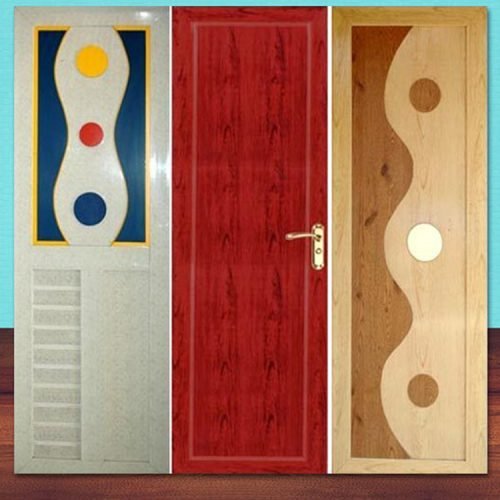PVC DOORS
A PVC door is a door made from Polyvinyl Chloride (PVC), a type of plastic that is valued for its durability, moisture resistance, and ease of maintenance. These doors are widely used in both residential and commercial settings due to their practical benefits, including their lightweight nature, affordability, and versatility in design. Here’s a detailed definition:
PVC Doors:
PVC doors are doors constructed from Polyvinyl Chloride (PVC), a synthetic plastic polymer known for its strength, durability, and resistance to various environmental factors such as moisture and termites. These doors are commonly used in both interior and exterior applications in homes, offices, and other buildings. Key aspects of PVC doors include:

- 1. Material Characteristics:
- Polyvinyl Chloride (PVC): PVC is a durable, lightweight, and water-resistant material that is commonly used in construction and furniture. It is non-porous, making it resistant to moisture, termites, and other pests.
- Types of PVC Doors:
- Solid PVC Doors: Entirely made from PVC, these doors are often hollow or foam-filled to enhance insulation and strength.
- PVC Laminated Doors: These feature a PVC laminate over a core material like wood or MDF (Medium-Density Fiberboard), combining the benefits of PVC with a more traditional door structure.
- 2. Durability and Maintenance:
- Water and Moisture Resistance: PVC doors are highly resistant to water and moisture, making them ideal for use in bathrooms, kitchens, and other areas prone to humidity.
- Termite and Pest Resistance: Unlike wooden doors, PVC doors are not susceptible to termites or other pests, which extends their lifespan without the need for chemical treatments.
- Low Maintenance: PVC doors are easy to clean and maintain, typically requiring only a wipe-down with a damp cloth to remove dust and grime.
- 3. Design and Aesthetics:
- Variety of Finishes: PVC doors are available in a wide range of colors, textures, and finishes, including wood grain effects, solid colors, and glossy or matte surfaces. This allows them to complement various interior design styles.
- Customizable Designs: PVC doors can be customized in terms of size, color, and design to suit specific aesthetic and functional requirements. They can also include features like glass inserts, decorative panels, or embossed patterns.
- Lightweight and Modern: PVC doors are lighter than traditional wooden doors, making them easier to install and more suitable for modern, sleek interiors.
- 4. Affordability:
- Cost-Effective: PVC doors are generally more affordable than doors made from wood or metal, making them a popular choice for budget-conscious projects. Despite their lower cost, they offer good durability and a range of design options.
- Low Installation Costs: The lightweight nature of PVC doors reduces installation costs, as they are easier to handle and require less labor to install compared to heavier materials.
- Accent Lighting: Decorative lighting, such as wall sconces or floor lamps, highlights artwork, architectural features, or key design elements.
- 5. Functionality:
- Versatility: PVC doors can be used in various settings, including residential, commercial, and industrial spaces. They are commonly used as bathroom doors, kitchen doors, and interior room doors, as well as for external entrances.
- Insulation: PVC doors provide good thermal and acoustic insulation, helping to maintain indoor temperatures and reduce noise levels.
- Ease of Use: PVC doors are available with various opening mechanisms, including hinged, sliding, and folding options, catering to different space requirements and preferences.
- 6. Environmental Considerations:
- Recyclability: PVC is a recyclable material, although the environmental impact of its production and disposal is a consideration. High-quality PVC doors are designed to last, reducing the need for frequent replacements and thereby contributing to sustainability.
- 7. Applications:
- Residential Use: PVC doors are widely used in homes, particularly in bathrooms, kitchens, and bedrooms, where moisture resistance and low maintenance are essential.
- Commercial and Industrial Use: PVC doors are also used in offices, hospitals, schools, and industrial buildings due to their durability and ease of maintenance.
- 8. Security Features:
- Strength and Durability: PVC doors can be reinforced with steel or other materials to enhance security. High-quality PVC doors can provide good protection against forced entry while maintaining a lightweight structure.
Summary:
PVC doors are a practical, durable, and cost-effective choice for both interior and exterior applications in a variety of settings. Made from Polyvinyl Chloride, these doors offer excellent resistance to moisture, pests, and wear and tear, making them ideal for areas prone to humidity and frequent use. With a wide range of design options and finishes, PVC doors can be customized to fit different styles and functional needs, all while offering the benefits of low maintenance, affordability, and ease of installation.
